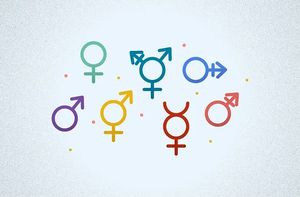Franciscan Fractal
Contemplating Today’s Culture through the Eyes of St. Francis & the Life of Christ
“Trans-What?”
God takes his stand in the council of heaven;
he gives judgment in the midst of the gods:
“How long will you judge unjustly?
and show favor to the wicked?
Save the weak and the orphan;
defend the humble and needy;
Rescue the weak and the poor;
deliver them from the power of the wicked.
Psalm 82:1-4
This past week, I saw a large historic “Pride Flag” in a local Starbucks. Last year there were no signs of any flag displayed that would prompt people to talk about equal rights, much less transgender issues. I found it interesting that the historic Pride Flag is a 6-colored traditional rainbow flag. It is unlike the Progress Flag which also incorporates additional colors: blue, pink and white to represent transgender people; and brown and black stripes to include marginalized people of color.
For me, the display of the historic 6-color Pride Flag helped me to focus on some of the present-day confusion that in the debates about transgender people including athletes (SCOTUS), youth, military people, and even clergy. The original Pride Flag was based the assumption that two people of the same-sex could potentially create a legitimate relationship. The supposition also was that there were only two sexes, i.e., male and female.
When transgender people entered the evolving evolution of personhood, the concept of gender entered into the debate. Gender, however, is not biological sex. Gender is a social construct that recognizes that people are more comfortable with a biological sex other than their own. It is based upon a deep feeling unrelated to a physical characteristic.
In time, groups of transgender people attached their political agendas to the gay movement conflating a right to “equality of same-sex unions” to the “equality of gender among all people.” While overlapping, these are two concepts are distinct.
When the concepts are blurred there is a propensity for misinterpretation, misjudgment with resulting antagonism. The animosity of many people to transgender athletes is seen in multiple state creating laws forbidding the competition of transgender students with students who are not transgender. The enormous number of documented events of bullying, assaults, and deaths of transgender people attests to the exclusionary nature of our culture.
Our culture is fixated on dualisms, i.e., there are only two ways of seeing events. It is “either or thinking.” When a child is born, the first question a person asks is, not whether the child is healthy or not, but what is the sex of the child. Is it a boy or a girl? So, the game begins and dualism ensues.
The sex of a person, however, is not a one-time event. A person’s identity is a mysterious integration of self, culture, and God’s loving designs over many years. Some people are drawn to sports, some to creative arts, some to the color yellow, and some to the color gray. As diverse as interests may be, most people continue to identify with the same sex they identify with at birth. Others do not. Each person’s growth pattern is individual and varied. (If you doubt that, take a look in the mirror and compare yourself to a picture of you as a teenager. How has the growth pattern affected you?)
Jesus was about breaking dualisms - all dualisms. That is why Jesus taught in parables. Parables destroy “either or thinking” helping a person to move beyond the dualisms that hold a person captive. There is no dualism in living only for God and God’s kingdom.
While the country moves in a direction of marginalizing, pushing out, and even punishing those who do not fit stated norms, Jesus’ command is different. In God’s house, “all are welcome.”
We are called not to make assumptions about another person’s journey. We are not to compare what we think is an ideal life for a person given their lived experience. Instead, we are called to “live in mystery,” trusting only in God’s love for us and God’s will for our own life. And that is not an easy task when our culture tells us something different and labels us as strange for being inclusive. As those in 12-step recovery groups would say in rebuttal, “What others think of you is none of your business.”
Rather than being concerned over a “transgender” person, the apostle Paul tells us to be concerned about how we are to be “trans-formed” by the renewing of our own mind. “And do not be conformed to this world, but be transformed by the renewing of your mind, so that you may prove what the will of God is, that which is good and acceptable and perfect.” Romans 12:2.
As Christians, we are to make certain that everyone has a home in society and as well in the church. In doing so, the question of the prophet, “How long will you judge unjustly?” is put to rest.
Prayers and Blessings,
Fr. John


